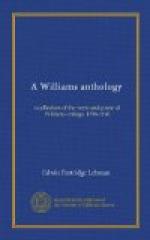When once the personal vein is struck, nothing is so easy as to find a theme for a letter. The materials are only too plentiful if the eyes and heart are open to receive them. Stevenson wrote that he scarcely pulled a weed in his garden without pondering some fit phrase to report the fact to his friend Colvin, and we may be sure that the weed was not allowed to wither, but when it was transplanted, flourished again and reached its destination in a veritable Pot of Basil. No great events are necessary; the plainest incident, the morning’s shopping, is as good as a Pan-American exposition for ideas to crystallize about, since exactly in proportion as an event is embedded in opinion, comment, and feeling, must its value as an epistolary item be rated. While the born letter-writer is driving a nail or polishing a shoe, a thought apropos of his occupation or of stars, perhaps, drops complete and perfect like ripe fruit in an orchard. It matters little; seen through the eyes of a friend, all homely things are invested with an extrinsic interest and a new glory not their own.
... By the very nature of the composition a mean man cannot possibly write a good letter. When we cast about for a perfect exemplar of the epistolary style, we must of necessity look among the high-souled men—Cowper, Lamb, FitzGerald, Hearn—for where else shall we find one to stand the test of self-revelation? Happily, one of the blithest, manliest, completest spirits of our times was a matchless writer of letters—Stevenson. Aching for absolute honesty of style and making clearness almost synonomous with good morals, he has given us in the Vailima collection and in the two larger volumes of his correspondence an almost unexampled self-revelation. The man Stevenson is in them, “his essence and his sting.” The grip of his hand and the look of his eye lose none of their force in the transparent medium through which they are constrained to pass. Knowing that a man who constantly gives his best finds his best constantly growing better, he never hoarded his ideas for publication, but poured his intellectual riches into a note to a friend as freely as if each line were coining him gold. It results that the lover of Stevenson would almost prefer to give up all the romances rather than the letters. For they feel that in this correspondence, besides finding the qualities which distinguish the other works, they have met face to face and known personally the romancer, the essayist, the poet, and above all the man who, ridden by an incubus of disease, spoke always of the joy of living, the man who knew hours of bitterness but none of flinching, the man who grappled with his destiny undaunted, and, when death hunted him down in a South Sea island, fell gallantly and gazing unabashed into “the bright eyes of danger.”




